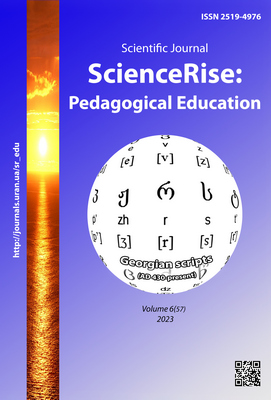The potential of place-based learning in terms of decolonization of education
DOI:
https://doi.org/10.15587/2519-4984.2023.297000Keywords:
decolonization, locally oriented education, national identity, civic education, secondary educationAbstract
The challenges facing Ukraine as a result of the Russian-Ukrainian war necessitate significant changes in approaches to education, particularly in terms of decolonization and the affirmation of Ukrainian identity. In this context, it is useful to take into account the pedagogical experience of developed countries that have faced similar problems in the past. First of all, we are talking about the use of educational practices of the pedagogical approach of Place-based Education, a trend that emerged in the late twentieth century, the fundamental principles of which are immersion of learning in the local context, establishing strong ties between the school and the territorial community, increased attention to national-patriotic and civic education, and priority didactic technologies - integrated and project-based learning. The purpose of the study is to reveal the potential of locally oriented learning in terms of decolonization of education and involves solving such tasks as analyzing foreign educational practices of locally oriented education that contribute to decolonization, identifying problems in the formation of the national identity of Ukrainian students, and formulating proposals for ways to overcome the identified problems. Methodology includes a set of theoretical methods to understand the world experience of locally oriented education, to analyze the prospects for the introduction of it in Ukrainian school education. The positive consequences of the introduction of locally oriented education are identified, namely: intensification of interaction between school, community and society, fostering affection for the native land, love for language and culture, and acquisition of historical knowledge. It is proved that locally oriented education contributes to the formation of national identity and citizenship of young people. Prospects for further research are seen in the study of the directions of implementation of locally oriented education
References
- Boone, J. (2019). Place-Based Education and Reconciliation. Department of Education Dordt University Sioux Center. Iowa. Available at: https://digitalcollections.dordt.edu/med_theses/137
- Fornear, D., Gregerson, R. (2022). Decolonizing Place-Based Education through Indigenous-Led Learning. University of Oklahoma HR 5880-999: Human Relations Capstone Diversity, Equity & Social Justice. Available at: https://discoverourimpact.oucreate.com/wp-content/uploads/2022/11/Assignment-3-Final-Research-Analysis.pdf
- Fu, S. (2023). Reclaiming Linnentown: a critical place-based approach to decolonize social studies curriculum. Social Studies Research and Practice. doi: https://doi.org/10.1108/ssrp-09-2023-0048
- Henry, E. (2014). A Search for Decolonizing Place-Based Pedagogies: An Exploration of Unheard Histories in Kitsilano Vancouver, B.C. Canadian Journal of Environmental Education, 19, 18–30.
- Scully, A. (2012). Decolonization, reinhabitation and reconciliation: Aboriginal and place-based education. Canadian Journal of Environmental Education, 17, 148–158.
- Pro osnovni zasady derzhavnoi polityky u sferi utverdzhennia ukrainskoi natsionalnoi ta hromadianskoi identychnosti (2022). Zakon Ukrainy No. 2834-IX. 13.12.2022. Available at: https://zakon.rada.gov.ua/laws/card/2834-20/conv
- Bazhan, O. H.; Smolii, V. (Ed.) (2022). U chomu poliahaie dekolonizatsiia v ukrainskomu publichnomu prostori v umovakh rosiisko-ukrainskoi viiny? Perelom: viina Rosii proty Ukrainy u chasovykh plastakh i prostorakh mynuvshyny. Dialohy z istorykamy. Kyiv: Instytut istorii Ukrainy NAN Ukrainy, 1, 109–111.
- Kovalova, O. (2023). Rezoliutsiia za pidsumkamy kruhloho stolu «Osvita obdarovanykh uchniv: podolannia suchasnykh vyklykiv ta yevrointehratsiia» (Kyiv, 30 travnia 2023 r.). Pedahohichni innovatsii: idei, realii, perspektyvy. Seriia «Psykholohichni nauky», 38–45.
- Kushnir, O. (2019). Ukraina yak post-kolonialna kraina: instytutsii, media, osvita. Ukrainskyi Katolytskyi Universytet. Lviv. Available at: https://www.academia.edu/41404505/_presentation_
- Makarenko, N. (2018). Natsionalna identychnist: osoblyvosti rehionalnoho vymiru. Naukovi zapysky IPiEND im. I. F. Kurasa NAN Ukrainy, 46, 100–116.
- Pometun, O. (2023). Current issues of forming the students’ national identity in teaching history and civic education. National and patriotic education of children and youth under martial law and post-war reconstruction of Ukraine: strategies and tasks. Herald of the National Academy of Educational Sciences of Ukraine, 5 (1), 1-4. doi: https://doi.org/10.37472/v.naes.2023.5116
- Khalamendyk, V. B. (2017). Nova shkola ta yii rol v podolanni naslidkiv postkolonializmu. Vyklyky postkolonializmu: filosofiia, relihiia, osvita. Kyiv, 43–44.
Downloads
Published
How to Cite
Issue
Section
License
Copyright (c) 2023 Viktoria Perevozniuk

This work is licensed under a Creative Commons Attribution 4.0 International License.
Our journal abides by the Creative Commons CC BY copyright rights and permissions for open access journals.
Authors, who are published in this journal, agree to the following conditions:
1. The authors reserve the right to authorship of the work and pass the first publication right of this work to the journal under the terms of a Creative Commons CC BY, which allows others to freely distribute the published research with the obligatory reference to the authors of the original work and the first publication of the work in this journal.
2. The authors have the right to conclude separate supplement agreements that relate to non-exclusive work distribution in the form in which it has been published by the journal (for example, to upload the work to the online storage of the journal or publish it as part of a monograph), provided that the reference to the first publication of the work in this journal is included.







